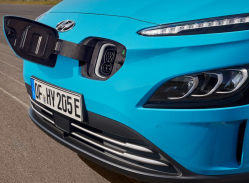
— Hyundai Kona Electric vehicles will no longer be sold in the automaker's home country of South Korea as battery fires, investigations and recalls drove down the popularity of the bestselling SUVs.
The battery fires caused a drop of 40% in Kona EV sales in Korea as customers complained about how Hyundai has handled the matter.
South Korean electric vehicle owners complain Hyundai doesn't seem to be taking the battery fires seriously enough as customers wait for replacement Kona EV batteries.
In February, Hyundai estimated it would cost about $900 million to replace the batteries in more than 75,000 Kona Electrics, and the automaker says it is doing all it can to ensure the safety of owners.
But some Kona EV owners say they aren't happy with the interim repairs offered by Hyundai during the wait for replacement batteries.
Kona Electric owners were first warned to park outside in October 2020 following at least 13 fires caused by short circuits in the batteries when they were charged. Hyundai said the batteries had problems with the lithium-ion cells, but the automaker was still trying to determine the root cause of the battery fires.
As 2019-2020 Hyundai Kona EV owners were warned to park away from anything that could burn, dealerships were told to update the battery system software and if needed, replace the batteries. The battery system update blocked owners from fully charging the batteries, keeping the charge capability to 90%.
Then in February 2021, Hyundai announced a worldwide Kona EV battery recall after a battery fire was reported in a SUV that had received the previous software update recall repair. The February recall requires Hyundai to replace the batteries at a cost of about $900 million.
Hyundai later determined the LG battery cells allegedly have anode tabs that could fold and allow the lithium plating on the tabs to contact the cathodes. The Kona EV replacement batteries will allegedly have an insulation coating on the cathodes within the battery cells to prevent battery fires.
The decision to halt Kona EV production for Korea likely won't affect U.S. consumers because Hyundai says it plans to continue exporting the SUVs.
With the Kona EV decision, Hyundai believes the Korean market is ready for the all-electric Ioniq 5 SUV which received tens of thousands of preorders.




